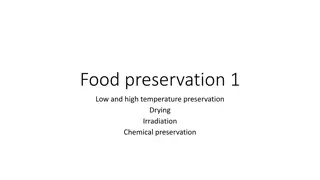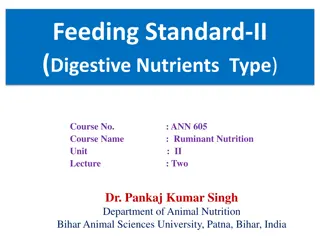Evaluation of feedstuffs by digestion experiments
The evaluation of feedstuffs through digestion experiments, including physical, chemical, and biological evaluations. It also discusses the measurement of digestibility and the different methods used for determining digestibility coefficients.
2 views • 49 slides
Fermentation as a Food Preservation Technique
Fermentation is a natural process where microorganisms alter the sensory and functional properties of food to create a desirable end product. This method not only extends shelf life but also improves nutritional value, aids digestibility, and enhances food safety. Fermentation does not require expen
1 views • 31 slides
Evolution of Feeding Standards for Ruminants: A Historical Perspective
The evolution of feeding standards for ruminants dates back to the 19th century, with pioneers like Grouven and Wolff introducing various criteria based on nutrient types and digestibility. Despite initial shortcomings, subsequent refinements by researchers like Professor Kuhn and Atwater have shape
0 views • 18 slides
Importance of Cooking Food for Health and Palatability
Cooking food is an ancient art that involves the application of heat to enhance digestibility, safety, and flavor. It aims to provide balanced meals, increase palatability, sterilize food partially, extend food preservation, and retain essential nutrients and flavors. Cooking also offers variety to
0 views • 8 slides



